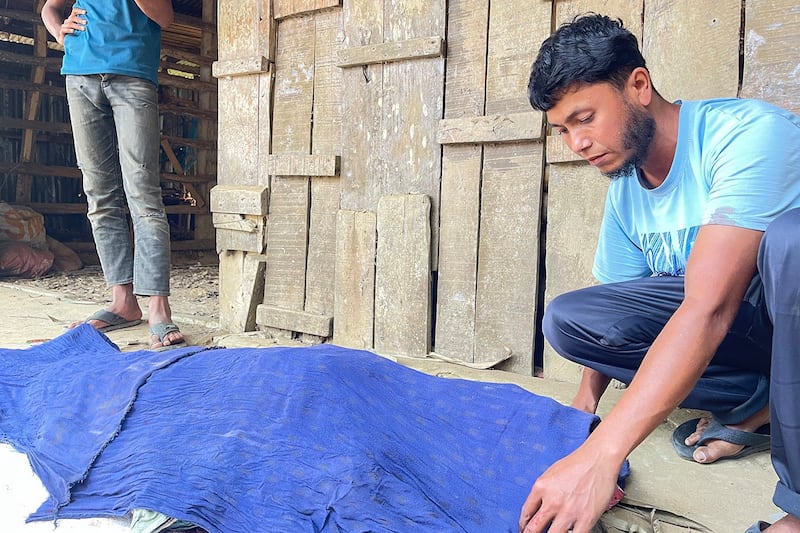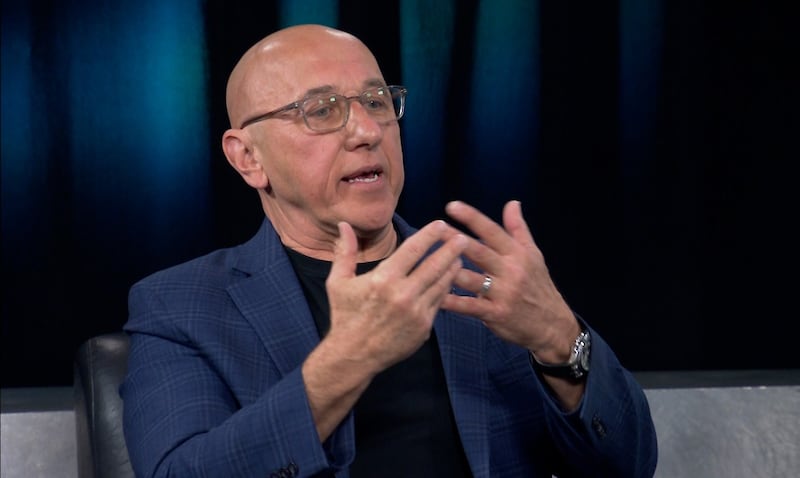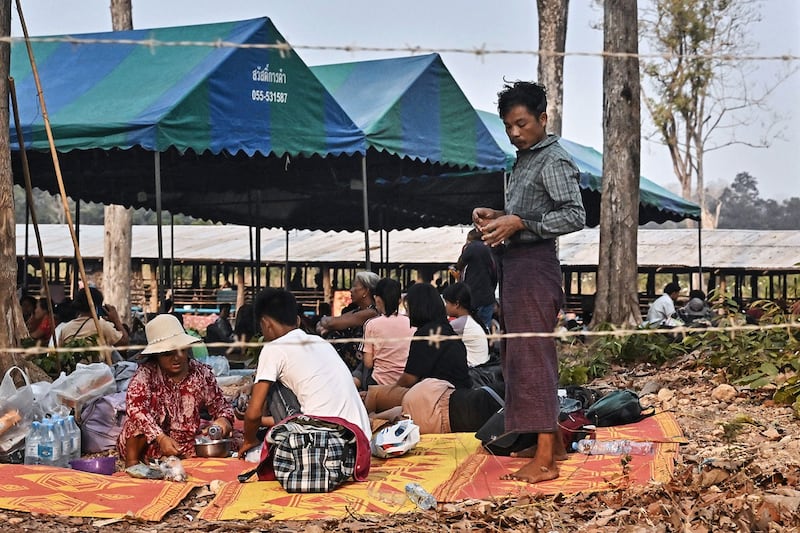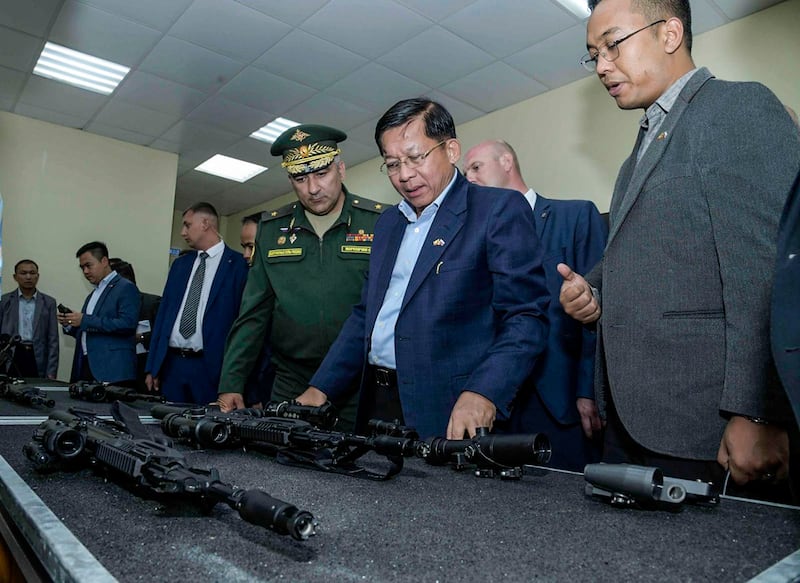Tom Andrews has served as the U.N. Special Rapporteur on the situation of human rights in Myanmar since 2020. The former U.S. Congressman for Maine is the author of papers examining the military’s claim as the government of Myanmar following its February 2021 coup d’etat and international arms networks that enable rights violations by the junta in the Southeast Asian nation.
Ahead of a trip to the United Nations in Geneva on Tuesday, Andrews spoke with Ye Kaung Myint Maung of RFA’s Burmese service about how the international community can support the people of Myanmar in the absence of a stronger stance by the UN Security Council. The interview has been edited for length and clarity.
RFA: In light of the dire circumstances in Myanmar, what message would you like to convey to both the junta and the people in Myanmar?
Andrews: Well, the junta's days are numbered. They are losing ground, literally. They are losing troops. They have lost all legitimacy. They are desperate. And so the idea that they tried to create – this idea that they are inevitable – everyone now can see through this. They are declining and they will continue to decline. The people of Myanmar have shown remarkable tenacity and courage. They are truly an inspiration to me and to many others. They deserve the support of the international community.
The international community has failed to provide that support in any kind of adequate measure. So my job is to work with member states of the United Nations and with the United Nations itself to encourage much stronger support for the people of Myanmar as they step forward to reclaim their country and their future.
RFA: Many people are trying to leave the country because of the compounding impact of the armed conflict and also the fear caused by the conscription law. What do you want to say to the countries who are receiving Myanmar refugees and migrants?
Andrews: Respect the principle of non-refoulement, accept people that are coming from Myanmar into your country. Protect them, support them, care for them, respect them. People from Myanmar are not crossing the border because they want to. They're doing so because they have to. Their lives are at stake. And so it is critically important for the international community and those living right next to Myanmar to support those people who are seeking safety.

Humanitarian aid
RFA: We’re seeing the international community pressure the junta to allow humanitarian access in the country. Is there an update on the international collaboration on open access into Myanmar?
Andrews: Well, first of all, the reason that there's a humanitarian crisis in Myanmar is precisely because of the junta. Before the coup, there were about a million people who were in need of humanitarian aid. Today, there's 18.6 million people in need of humanitarian aid. That's all since the coup. So it's the junta that's driving the need for humanitarian aid, driving this desperation.
On top of all of that, they are restricting access to those who are seeking to provide humanitarian aid to those in desperate need. They're blocking roads. They're creating all these bureaucratic obstacles, requirements for travel authorizations, a variety of ways in which aid is being blocked. It's a horrific situation that's being made worse by the junta and driven by the junta.

I think what the international community needs to do is look at those areas – those expanding areas, those conflict areas outside of what the junta can control – and find ways to provide greater aid, greater support to those conflict areas, using the organizations – the citizen organizations, CSOs, NGOs – that have direct access to those communities. Provide that aid, get it into their hands so that they can in turn get that aid to people inside of these conflict areas.
That's where I think a greater focus of the international community needs to be, because the growth in the need for humanitarian aid is in these areas that are under siege.
Ending support for junta
RFA: So your recent report at the United Nations highlighted Russian involvement with Myanmar’s military. So can you shed some light on that?
Andrews: Well, I've released two reports on how the junta is getting its weapons. And the report that you're referring to, what I call " the billion dollar death trade," I released this past year. And I list the countries that are providing these weapons. Number one, as you say, Russia. Number two, China. And number three, in that report, Singapore. 138 Singapore-based entities were involved in the transfer of US$254 million worth of weapons materials into Myanmar.
Now, the bad news is I don't see much changing with respect to Russia as being the number one source of weapons. I made it clear in the report that, unlike Russia or China, there was no evidence that Singapore knew that these transfers were being made.
I'm about to head to Geneva … I'll be giving an updated report on what's been developing. And in that report, I'm going to indicate that there has been a significant reduction in the transfer of weapons materials from Singapore over the course of the last several months. So that's a very, very good sign.
RFA: With regard to the international collaboration to cut ties with the junta and to cut their resources and revenue – where are we on that?
Andrews: Well, first of all, we're nowhere when it comes to the Security Council. The Security Council has the authority to establish an arms embargo, to refer the junta – those responsible for these atrocities – to the International Criminal Court, to take these measures.

Because they're unable or unwilling to do so, because of the lack of political will, it leaves it up to member states who care about human rights in Myanmar, who want to stand with the people of Myanmar, to do it themselves.
Now, the good news is many [member states] have been doing so. And I've been reporting on arms embargoes, the freezing of assets, the fact that countries like the United States and now Australia are sanctioning banks. These are all positive steps to continue to weaken the junta's capacity to commit its violence. The problem is they're not being done in a strategic, coordinated way.
And what I'll be recommending … in Geneva is that those countries who support pressuring the junta need to build a network, a coalition, if you will. Sit down and identify together what are the points in which we think we can be most effective in undermining the capacity of the junta to continue its violence. Target those points of vulnerability of the junta, and then coordinate actions, all the sanctions and other types of actions, to those points and then work together to enforce those sanctions. I think that kind of coordinated approach is necessary, particularly because the Security Council is not going to take those actions.
Onus on member states
RFA: What can we expect from the upcoming U.N. General Assembly and U.N. Security Council meeting?
Andrews: I'm an optimist by nature. The U.N. General Assembly has passed resolutions that have expressed their support for human rights in Myanmar, for the people of Myanmar. They've called for member states to prevent the flow of weapons into Myanmar. The Security Council has expressed, to various degrees, support for the people of Myanmar and called for a cessation of violence.

But those are words. It's not action. And what the people of Myanmar desperately need right now are not more words from member states or from politicians, but some action to back those words up.
That action is going to have to come from individual member states working together in coordination to cut off the weapons that the junta needs, cut off the money that they're going to need and to support the humanitarian needs of the people of Myanmar. That takes more than words. That takes action.
Edited by Josh Lipes and Malcolm Foster.
